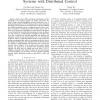Free Online Productivity Tools
i2Speak
i2Symbol
i2OCR
iTex2Img
iWeb2Print
iWeb2Shot
i2Type
iPdf2Split
iPdf2Merge
i2Bopomofo
i2Arabic
i2Style
i2Image
i2PDF
iLatex2Rtf
Sci2ools
TON
2016
2016
The Streaming Capacity of Sparsely Connected P2P Systems With Distributed Control
—Peer-to-Peer (P2P) streaming technologies can take advantage of the upload capacity of clients, and hence can scale to large content distribution networks with lower cost. A fundamental question for P2P streaming systems is the maximum streaming rate that all users can sustain. Prior works have studied the optimal streaming rate for a complete network, where every peer is assumed to communicate with all other peers. This is however an impractical assumption in real systems. In this paper, we are interested in the achievable streaming rate when each peer can only connect to a small number of neighbors. We show that even with a random peer selection algorithm and uniform rate allocation, as long as each peer maintains Ω(log N) downstream neighbors, where N is the total number of peers in the system, the system can asymptotically achieve a streaming rate that is close to the optimal streaming rate of a complete network. We then extend our analysis to multi-channel P2P networks, and we...
TON 2016 |
Related Content
| Added | 11 Apr 2016 |
| Updated | 11 Apr 2016 |
| Type | Journal |
| Year | 2016 |
| Where | TON |
| Authors | Can Zhao, Xiaojun Lin, Chuan Wu |
Comments (0)

